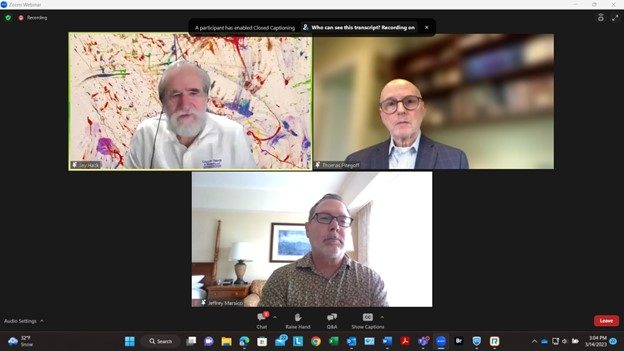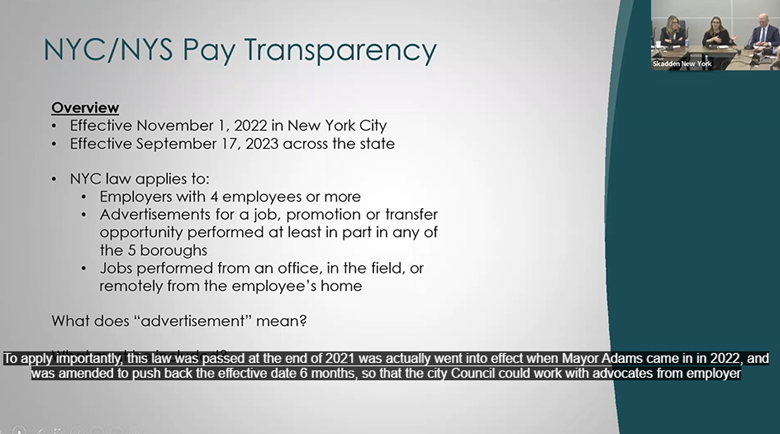Former Chair of House Financial Services Committee Barney Frank Gives Insight Into the Latest Banking Crisis at NYSBA Webinar
3.24.2023
 Retired Democratic Rep. Barney Frank of Massachusetts said that small businesses cannot be expected to be experts on a bank’s financial stability during a New York State Bar Association webinar on the banking crisis.
Retired Democratic Rep. Barney Frank of Massachusetts said that small businesses cannot be expected to be experts on a bank’s financial stability during a New York State Bar Association webinar on the banking crisis.
Frank spoke for most of the final 20 minutes of the panel, which also featured Sara Kelsey, former general counsel to the FDIC during the 2008 financial crisis, and Marjorie Gross, who has worked as in-house counsel to several banks and is the past chair of the association’s Committee on Professional Ethics.
Jay Hack, head of the financial institutions group at Gallet, Dreyer and Berkey and former chair of the NYSBA Business Law Section, moderated the discussion, which took place on Thursday afternoon and touched upon numerous regulatory issues and ethics questions.
“A businessperson putting their money in a bank cannot be expected to evaluate the bank, especially when you’re talking about a small businessperson,” said Frank. “I suppose that major corporations can hire analysts to do that, but a small businessperson who has the need for $1 million or so in operating expenses, at least for a month; that person can’t become a sophisticated bank examiner.”
Frank, the leading co-sponsor of the 2010 Dodd-Frank Act, said instead that banks should bear more of the burden for those individuals.
“I do not understand the argument that you add to the burden of the businessperson by putting him or her at risk if he or she is not perfectly good on judging the soundness of the bank. I think you could set up something that required a bank to show that it had a month’s operating expense, maybe two, … and give the businessperson an insurance guarantee in that amount.”
Earlier in the program, Kelsey spoke about how banking regulations are in place to help maintain the public’s confidence in the system.
“The rules around banking ebb and flow so during a banking crisis, everybody thinks there needs to be a lot more rules, and then, as it fades into memory, everybody thinks it should be deregulated.”
Kelsey explained that the regulations surrounding the industry are designed by the banks themselves.
“The rules and regulations start with what happens within the bank itself, because the bank itself is primarily responsible for the way our system is designed. Banking is not a state-run facility. It’s a private enterprise,” she said. “The rules and regulations around banking are there to keep public confidence in the system because as we can see, when confidence falters just a little bit, the only thing to fear is fear itself if that begins to set in with the public.”
Kelsey also discussed the misnomer that the FDIC fails a bank when it is the regulators that decide to pull a bank’s charter. The FDIC then steps in to offer resolutions.
“It is the regulator that fails the bank. The charter is how the bank is born and it is what gets pulled to cause it to die. They then turn around and ask the FDIC to come in and resolve the situation.”
Gross then spoke on compliance issues surrounding operating and trust accounts.
The panel was sponsored by the Business Law Section and was capped by a Q&A session, a few of which appear below.
Go here to register for access to the full webinar.
Q: Are we covered if the deposit from a beneficial owner is over $250,000? These days a deposit for a real estate transaction may be over $250,000.
A: No. You’re only covered to $250,000 unless you’re using a program like CDARS or ICS. You’re only covered to $250,000. You could use more than one bank, however.
Q: As the seller’s attorney, should we now ask the buyer of a property if they have any accounts at the bank where we are depositing their contract deposit?
A: Yes, because each Benny is only going to get insurance up to $250,000 and all their deposits are going to be aggregated in determining the $250,000.
Q: I have $750,000 in an estate account. Is it FDIC insured? If not, what I should do?
A: It’s only insured up to $250,000, so you may want to divide it into three banks.






